Love them, but not too much: SPCA's longest-serving employee on coping with the ups and downs of handling animals for 46 years
Over the decades of tending to animals that were abandoned, rescued, lost or abused, Mr Pribakaran Kunju said the key to handling his emotions through the many ups and downs is to love them without getting too attached.
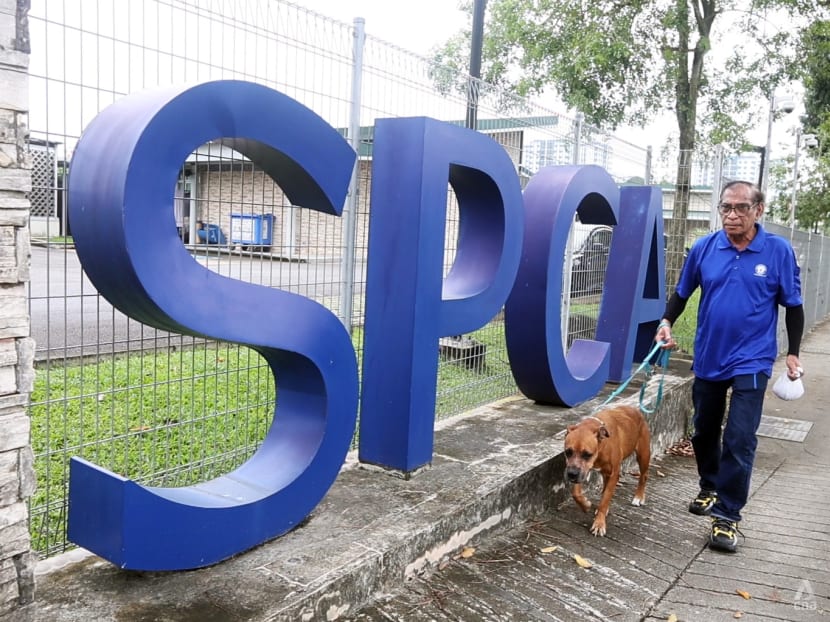
Senior shelter executive Pribakaran Kunju walking a dog outside the headquarters of the Society for the Prevention of Cruelty to Animals along Sungei Tengah Road on Jan 23, 2025. (Photo: CNA/Ooi Boon Keong)

This audio is generated by an AI tool.
It would be easy to make the mistaken assumption that Mr Pribakaran Kunju joined the Society for the Prevention of Cruelty to Animals (SPCA) Singapore to answer a personal calling, given that he has served there for almost five decades.
The truth is, this longest-serving employee at the animal welfare organisation started out afraid of dogs and did not have any particular affinity for other furry creatures.
Mr Pribakaran, who turns 69 this month and is married with children, had stumbled upon the job opportunity during a chance meeting with an old friend back in 1979.
“My friend had asked me, ‘Do you want a job at SPCA?’ And I replied, ‘What is SPCA?’” he told me candidly.
Despite his initial hesitation at signing up for a job involving animals, Mr Pribakaran eventually agreed to go for an interview with his friend, who promised him that he would have nothing to fear because they would be working side by side.
However, he had to confront his phobia from the moment he stepped into the SPCA office, then located along Orchard Road, for the job interview in November 1979.
“The dogs all rushed to me. You know what I did? I was very frightened, so I went and hugged my friend. ‘I don't want, I don't want. The dogs, all coming, smelling, smelling'.” he recounted. “Wah, I was very scared.”
Fast forward 46 years and you could say Mr Pribakaran is a changed man.
For one whole morning at the SPCA grounds along Sungei Tengah Road recently, I observed how the senior shelter executive effortlessly helped to clean the cat enclosures and feed them while lovingly petting them.
He also took a dog for a walk around the premises that morning, all his old fears having vanished through the years of working with the creatures and falling in love with them.
CHILDHOOD FEAR OF DOGS
Growing up, his family had never kept any pets and he “never interacted” with animals when he was younger, Mr Pribakaran told me.
“Once a dog barked, I would run, move away from that,” he said. “We didn’t want to get near the dogs.”
After National Service, Mr Pribakaran began working in the shipping industry, where he was paid by the day and was given shifts only when there was work to be done.
So when he bumped into the friend who said there was a job opportunity at SPCA offering a stable monthly salary, Mr Pribakaran's curiosity was piqued despite his aversion to dogs.
And indeed, that friend stood by him and reassured him in those early days on the job, when Mr Pribakaran had to learn to bathe dogs at the shelter and get used to being around them every day.
“I was doing it slowly, slowly. And he would tell me, ‘Don’t worry, it won’t bite’,” he recalled.
“Of course, to him, it won‘t bite. But for me, how would I know if the dog would bite or not?”
Mr Pribakaran’s friend worked alongside him at SPCA for more than a decade, but the friend resigned due to health issues. They continued keeping in touch until the friend died some years later.
FROM BEING DOG-FEARING TO DOG RESCUER
Through the years, Mr Pribakaran has worked in various roles and performed many duties at SPCA.
He started as an animal care officer, also known back then as a kennel keeper. His main tasks included bathing the animals and their enclosures. He progressively took on other duties, such as being a driver for the company's vehicles and later on, became a supervisor to younger officers as well.
Now, as a senior shelter executive, his main task involves following up on reports of pets that were lost or found, calling up the owners to get more information from them and eventually reuniting them with the animals.
Through constant training and exposure, Mr Pribakaran has not only overcome his fear of dogs but also become adept at handling them. He has even pulled off several successful dog rescues, including in dangerous situations.
One of the most memorable incidents that he could recall was when he rescued a dog from an MRT train track.
It was about 20 years ago and he was at church with his family on a Sunday when SPCA received an urgent call for help.
“So I told my wife that I'm going to the rescue. Because that’s our job, even when we are eating, when they say there’s an injured animal, we just put the food aside and we will go tend to the emergency,” he said.
Mr Pribakaran said the situation was particularly stressful because he was given only a few minutes to complete the rescue, to minimise further disruption to the train schedule.
“It was very dangerous and I was so scared, because there was (a rail carrying) electric current along the side. If I made a misstep, even slightly, anything may have happened,” he recounted.
He could not recall more details from the episode, such as the exact location where it occurred, or what happened to the dog after the rescue. He just remembered that he somehow pulled off the rescue despite the odds.
Another memorable – but unpleasant – incident, also around 20 years ago, was when he rescued an abandoned German shepherd dog.
As the colleague assisting him did not hold on to the leash properly, the dog bit Mr Pribakaran while he was lifting it into the van.
“Very bad, the hand, very bad. I just sat down and cried,” he said of the injury he sustained from the bite.
I asked if that incident re-triggered his past fear of dogs, but he said it didn’t and that he was fine after a couple of days.
“I never thought, ‘I don't want to work (anymore)’ ... because it was just an animal and the mistake was already made. After that, we were very careful,” he said.
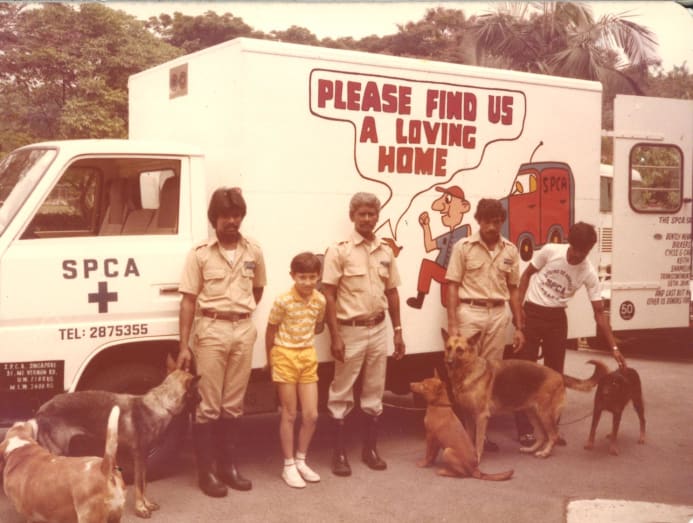
Today, Mr Pribakaran is no longer involved in rescue works, but I could still see his years of accumulated experience on full display when we spent the morning together.
He was cleaning around five cat enclosures, one after another, so swiftly that he probably completed his task faster than I usually take to clean my cats’ two litter boxes at home.
Just as speedily, he prepared food and fed a few cats in the shelter, and even took time to pat and play with them a little.
Such tasks, I learnt, are not the main part of his job scope, which is to help reunite owners and their lost pets, but Mr Pribakaran does it anyway to lend a helping hand to other staff members and volunteers.
In the last financial year ending June 2024, SPCA took in 1,155 animals that were either rescued or surrendered by members of the public. In that period, 459 were either reunited with their owners or released back into the community.
Handling cases of lost pets can be a delicate task, he said.
“I've come across (cases) where, before I talked, the owner already started crying, ‘Woo woo woo’.”
He told of how he always takes time to soothe the pet owner first, so that they can calm down enough to communicate every possible detail that might be useful in recovering their pets.
He also advises them on practical steps they may take to improve their chances of finding their lost pets, such putting up posters around their neighbourhood and online.
How long it takes to find lost pets really varies from case to case, but the joy of reunion is a constant, he said.
“You know, when the owners sit down, we take the dog here, then the dog will run and jump to them and kiss them. Immediately, we know for sure already, this dog belongs to them. So that's a happy, happy ending for the dog and owner.
“So we’re also very happy because the dog is returning to the right home.”
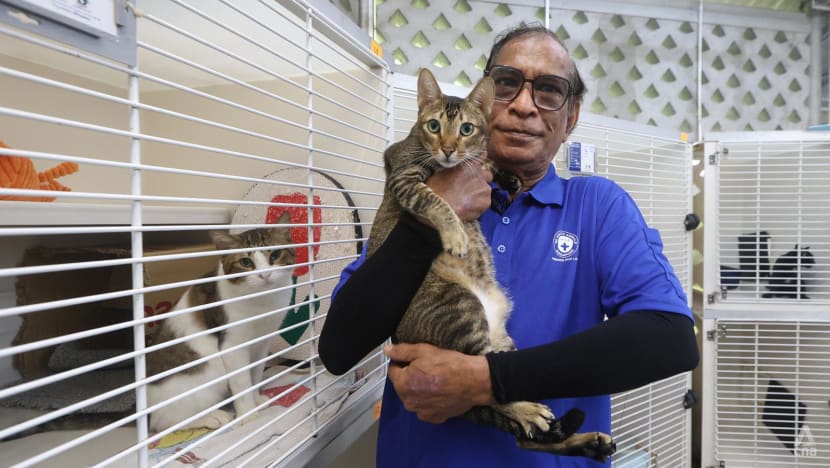
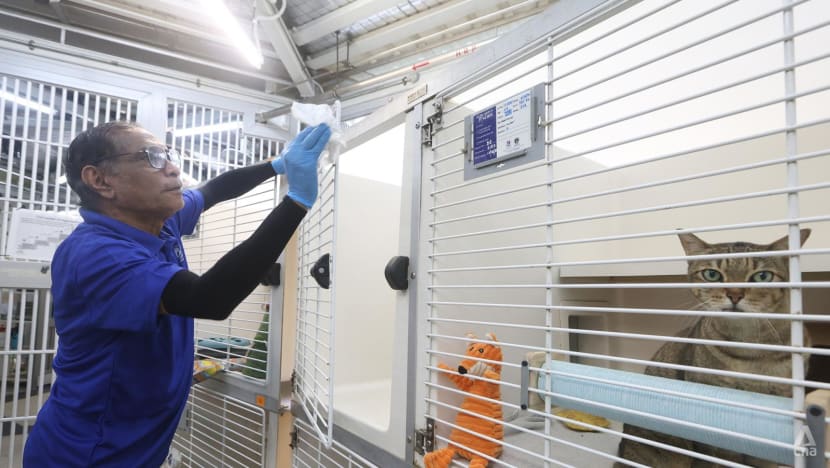
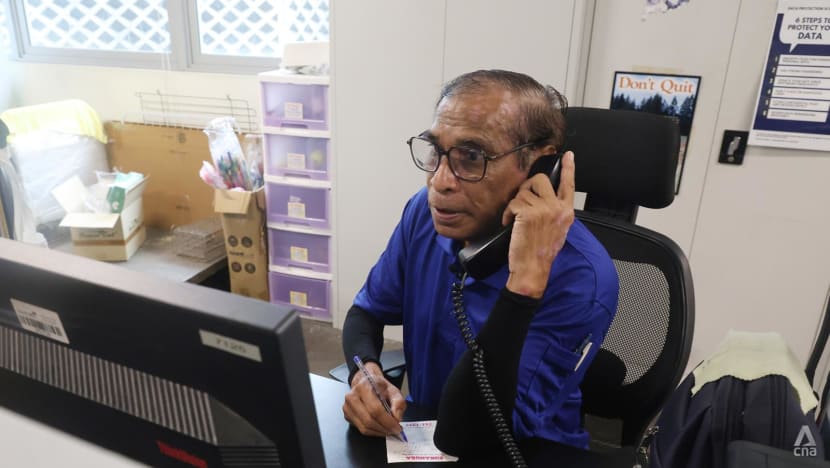
OF LOVE AND NON-ATTACHMENT
After a few years of handling dogs and vanquishing his fear of them, Mr Pribakaran even adopted one at the encouragement of his supervisor.
“It was a Pekingese, but it didn’t have one eye, had one eye only. I took care of the dog, it stayed with me for about 10 to 12 years, then got sick and passed on,” he said.
“After my pet died, I did not feel like I wanted to keep another one, because the feeling (of loss) was very bad.”
I could empathise with this completely. I lost one of my pet cats seven years ago. It died of cancer. Till today, I still have a photo of it as the digital wallpaper on my tablet, while my parents, still affected by the loss, resolved not to take in any more cats.
When I asked how he coped with the many losses he has undoubtedly encountered in his 46 years working at SPCA – last year alone, 177 sick animals died in shelter care at SPCA – Mr Pribakaran said the key is to love them without getting too attached.
Through the years, he has seen many injured animals being taken into the shelter and eventually dying. In such moments, he said, he would usually be comforted by the thought that the veterinarians had tried their best to give these animals a fighting chance.
This approach of love without attachment helps him cope not only when he has to witness an animal's death, but also when he has to separate from an animal for happier reasons.
“I give you an example. If I love the cat too much, if the cat goes home (to its owners), I would feel sad because I’m separated from it. But I don't, I am happy because the cat gets to go home, the dog gets to go home.”
On the flip side, Mr Pribakaran said that he gets “very sad” whenever he reads about cases of abandonment, neglect and cruelty.
Last year, SPCA saw animal cruelty and welfare cases soar to a 12-year high of 961 confirmed cases.
“We’re very sad, but what can we do about it? We just try our best for the next animal,” he said, adding that he wishes prospective pet owners would think very carefully before taking in pets, because they are life-long commitments.
Wrapping up our conversation that morning, I asked him what his advice was for career longevity, as someone who has spent almost five decades at one organisation.
He told me that the key is to find a job that you love and find meaning in it, because when it is meaningful, this will eventually outweigh other considerations. At least, that has been the case for him.
Although he first took on a role at SPCA because he needed income stability, it was his love for the job and animals that has kept him rooted in the organisation through the years.
“When it comes to work, people might say, ‘I must have S$5,000, S$10,000, then I work’,” he said.
“For me, if it’s S$200 or S$100, I’ll still work. Because why? It’s for the animals that I stay, that is one thing that makes me stay for over 40 years.”











